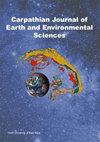Petroleum Filling Stations and Their Impact on the Environment in Nigeria
IF 0.9
4区 环境科学与生态学
Q4 ENVIRONMENTAL SCIENCES
Carpathian Journal of Earth and Environmental Sciences
Pub Date : 2022-02-22
DOI:10.30564/jees.v4i1.4073
引用次数: 2
Abstract
The poor state of the environment, especially in urban areas, has become a major global issue, with developing countries such as Nigeria voicing growing concern. There is a scarcity of knowledge on the environmental impact of PFSs as a result of the loss of life and property, as well as other serious socio-economic implications of non-compliance with PFSs siting criteria. The historical literature on the impact of residential buildings, the environment, and human health on PFSs in Nigeria, as well as the study’s gap, is examined in this research. It also outlines DPR compliance with PFSs location as well as established criteria for prohibiting PFS siting in Nigeria’s states. Relevant publications on PFSs-related topics were downloaded from Google Scholar. The goal of this study is to look back on a previous essay about PFSs in Nigeria and its impacts on the environment and human health. This study’s main purpose is to give a complete overview of Nigerian PFSs. According to the article analyzed, the majority of PFSs were located close to residents, with setbacks from the road and residential areas of less than 30 m in 90% of the filling stations. As a result, the landowners can band together to argue that a facility that is improperly sited cannot be built. A great deal of public participation is required. A campaign should be launched to raise awareness among filling station owners and other developers of the dangers of non-compliance with established norms. All violators of the established norms, as well as corrupt officials of enforcement agencies/bodies, should face open punishment so that others might learn their lessons. Finally, appropriate planning is required to allow future road expansion.尼日利亚的加油站及其对环境的影响
恶劣的环境状况,特别是城市地区的环境状况,已成为一个重大的全球性问题,尼日利亚等发展中国家表达了日益严重的关切。由于生命和财产的损失,以及不遵守PFSs选址标准所造成的其他严重社会经济影响,对PFSs的环境影响缺乏了解。本研究考察了关于尼日利亚住宅建筑、环境和人类健康对pfs影响的历史文献,以及该研究的差距。它还概述了DPR遵守PFS地点的情况,以及禁止PFS在尼日利亚各州设立的既定标准。从Google Scholar下载了与pfss相关主题的相关出版物。本研究的目的是回顾以前一篇关于尼日利亚PFSs及其对环境和人类健康的影响的文章。本研究的主要目的是给出尼日利亚pfs的完整概述。根据这篇文章的分析,大多数加油站都靠近居民,90%的加油站距离道路和居民区不到30米。因此,土地所有者可以联合起来争辩说,选址不当的设施不能建造。这需要大量的公众参与。应发起一项运动,提高加油站业主和其他开发商对不遵守既定规范的危险的认识。所有违反既定准则的人以及执法机构/机关的腐败官员都应受到公开惩罚,以便其他人可以从中吸取教训。最后,需要适当的规划,以允许未来的道路扩建。
本文章由计算机程序翻译,如有差异,请以英文原文为准。
求助全文
约1分钟内获得全文
求助全文
来源期刊
CiteScore
2.30
自引率
25.00%
发文量
42
审稿时长
12-24 weeks
期刊介绍:
The publishing of CARPATHIAN JOURNAL of EARTH and ENVIRONMENTAL SCIENCES has started in 2006. The regularity of this magazine is biannual. The magazine will publish scientific works, in international purposes, in different areas of research, such as : geology, geography, environmental sciences, the environmental pollution and protection, environmental chemistry and physic, environmental biodegradation, climatic exchanges, fighting against natural disasters, protected areas, soil degradation, water quality, water supplies, sustainable development.

 求助内容:
求助内容: 应助结果提醒方式:
应助结果提醒方式:


